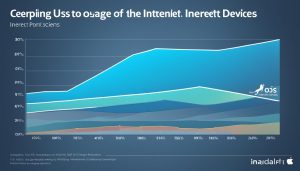Welcome, marketers! In today’s digital landscape, it’s crucial to stay up-to-date with the latest trends and insights in mobile search. With Google’s dominance in the search engine space and the increasing prevalence of mobile devices, understanding the intersection between Google and mobile search is key to your marketing success.
In this article, we will explore the importance of mobile SEO and how it impacts your marketing strategies. We will provide practical tips and techniques to help you maximize your mobile SEO efforts, ensuring that your brand is visible and accessible to mobile users.
But first, let’s take a closer look at the current mobile landscape and how it influences your marketing approach. The rise of smartphones and Google’s emphasis on mobile-first indexing have revolutionized the way people search for information. It’s essential to understand these factors to adapt your marketing strategies effectively.
To illustrate the significance of mobile search, take a look at the following image:
As you can see, mobile search has become a dominant force in the digital realm, and Google plays a central role in connecting users with the information they seek. As marketers, it’s crucial to optimize your strategies for mobile devices to reach your target audience effectively.
In the following sections, we will dive deeper into maximizing your mobile SEO efforts and explore the future trends you should be aware of in mobile search. Get ready to elevate your marketing game and unlock the full potential of Google and mobile search!
Understanding the Mobile Landscape
As marketers, it is crucial to understand the current mobile landscape and how it impacts our strategies. Mobile usage has been on the rise, with smartphones becoming an integral part of our daily lives. In fact, a significant portion of online searches and website visits now come from mobile devices. This shift in consumer behavior has forced marketers to adapt their approach to mobile search.

Google has also recognized the growing importance of mobile search and has made significant updates to its algorithms to enhance the mobile user experience. One of the key updates is mobile-first indexing, which prioritizes mobile-friendly websites in search results. This means that websites optimized for mobile devices have a higher chance of ranking well on Google.
By understanding the mobile landscape and the significance of mobile-first indexing, marketers can make informed decisions and tailor their strategies accordingly. It is no longer enough to have a website that is only optimized for desktop users. Marketers must prioritize mobile optimization to ensure a seamless and user-friendly experience for mobile users.
Maximizing Mobile SEO for Marketers
In today’s mobile-first world, optimizing your mobile SEO strategy is crucial for marketers to stay ahead of the competition and reach their target audience effectively. By implementing the following practical tips and techniques, you can enhance your visibility, improve rankings, and drive more organic traffic from Google’s mobile search results.
Responsive Design
One of the key factors in mobile SEO is having a responsive design. A responsive website adapts and adjusts its layout based on the screen size of the device being used. This ensures that your website looks and functions great on different mobile devices, providing a seamless user experience. Google prioritizes websites with responsive design in its mobile search rankings, so make sure your site is mobile-friendly.
Mobile-Friendly Content
Creating mobile-friendly content is essential for engaging and capturing the attention of mobile users. Consider the mobile context and optimize your content accordingly. Use shorter paragraphs, bullet points, and subheadings to make it easier for users to skim through your content. Also, optimize your images and videos for mobile devices to improve loading speed and user experience.
Page Speed Optimization
Page speed is a crucial ranking factor in mobile search. Users expect fast-loading websites on their mobile devices, and Google rewards sites that provide a speedy experience. Analyze and optimize your website’s performance by compressing image sizes, minifying code, enabling browser caching, and leveraging content delivery networks (CDNs). By improving your page speed, you can enhance user experience and boost your mobile search rankings.
Structured Data
Implementing structured data on your website can help search engines understand your content better and display rich results in the search engine results pages (SERPs). Structured data provides additional context and information about your content, such as ratings, reviews, and product details. Adding structured data markup to your website can enhance your visibility and attract more clicks from mobile users.
Remember that mobile SEO is an ongoing process, and it’s important to regularly monitor and analyze your performance. Keep up with the latest mobile trends and algorithm updates to adapt your strategies accordingly. By maximizing your mobile SEO efforts, you can generate more organic traffic and improve your overall online presence in the mobile search landscape.
| Benefits of Maximizing Mobile SEO for Marketers | Challenges Faced by Marketers in Mobile SEO |
|---|---|
|
|
Future Trends in Mobile Search for Marketers
As technology continues to advance at a rapid pace, it’s crucial for marketers to stay ahead of the game and adapt their strategies accordingly. In this final section, we will explore the future trends and developments in mobile search that marketers should keep an eye on.
One of the key trends shaping the mobile search landscape is the rise of voice search. With the increasing popularity of virtual assistants like Siri, Alexa, and Google Assistant, more and more users are relying on voice commands to perform searches. Marketers need to optimize their content for voice search queries and ensure it provides concise and accurate answers to users’ questions.
Another trend to watch out for is the integration of mobile AI technologies into search algorithms. AI-powered features, such as personalized recommendations and predictive search, are changing the way users interact with search results. Marketers should leverage these advancements by utilizing data-driven insights to deliver highly relevant and personalized mobile experiences.
Furthermore, the continuous advancements in augmented reality (AR) and virtual reality (VR) present exciting opportunities for marketers. AR and VR technologies have the potential to revolutionize mobile search by enabling users to visualize products and services in a more immersive and engaging way. Marketers should explore the possibilities of incorporating AR and VR into their mobile strategies to provide memorable and interactive experiences.




